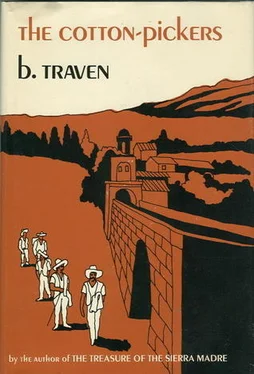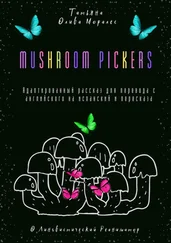B. Traven - The Cotton-Pickers
Здесь есть возможность читать онлайн «B. Traven - The Cotton-Pickers» весь текст электронной книги совершенно бесплатно (целиком полную версию без сокращений). В некоторых случаях можно слушать аудио, скачать через торрент в формате fb2 и присутствует краткое содержание. Год выпуска: 1969, Издательство: Hill and Wang, Жанр: Проза, на английском языке. Описание произведения, (предисловие) а так же отзывы посетителей доступны на портале библиотеки ЛибКат.
- Название:The Cotton-Pickers
- Автор:
- Издательство:Hill and Wang
- Жанр:
- Год:1969
- ISBN:нет данных
- Рейтинг книги:3 / 5. Голосов: 1
-
Избранное:Добавить в избранное
- Отзывы:
-
Ваша оценка:
- 60
- 1
- 2
- 3
- 4
- 5
The Cotton-Pickers: краткое содержание, описание и аннотация
Предлагаем к чтению аннотацию, описание, краткое содержание или предисловие (зависит от того, что написал сам автор книги «The Cotton-Pickers»). Если вы не нашли необходимую информацию о книге — напишите в комментариях, мы постараемся отыскать её.
—Book World
The Cotton-Pickers — читать онлайн бесплатно полную книгу (весь текст) целиком
Ниже представлен текст книги, разбитый по страницам. Система сохранения места последней прочитанной страницы, позволяет с удобством читать онлайн бесплатно книгу «The Cotton-Pickers», без необходимости каждый раз заново искать на чём Вы остановились. Поставьте закладку, и сможете в любой момент перейти на страницу, на которой закончили чтение.
Интервал:
Закладка:
When I awoke the sun was low. Whether it was rising or setting I didn’t know; I was a stranger here, trying to get my bearings, where the landscape seemed a bit unsteady.
“Hello, you down there, have you slept off your booze yet?” Mrs. Pratt called from the porch of the ranch house. “My old fool of a husband sure picked a fine type of man, I must say. I can just see you driving the cattle into the Panama Canal, you drunk! It’s good that there is a canal there, or we’d be chasing after you to Brazil, or wherever you wind up with them. Come in here now and have something to eat.”
I ate a little of everything so as not to upset the good woman still further. Mr. Pratt sat over his food and picked about in his plate, not looking up, acting as if he didn’t know me, grunting when I spoke to him. I knew the dodge, that he’d told his wife that I’d led him on, and that he was through with me, but that as he’d already incurred expenses on my behalf he’d send me off with the herd and have nothing more to do with me.
When Mrs. Pratt went out into the kitchen for a moment, he said: “Listen, my boy, be a good sport and play the game. It’ll all blow over by tomorrow. She’s not a bad sort; really, she’s a grand soul. Only she can’t stand drinking.” Suddenly his tone changed: “You shouldn’t have kept on asking me to drink to the President, to the national flag, and then to the cattle! I told you beforehand that I didn’t drink. But what could I do when you started drinking toasts? It wasn’t fair!”
Well, well, well. What? What was this — oh, Mrs. Pratt had come back into the room, so he was putting on his act. And he sure knew how to do it. He’d thundered out these last few words to such effect that Mrs. Pratt settled herself stiffly onto her chair, as if to say, “There you are, see what a decent guy my husband is. He drinks only out of patriotism, while with you — it’s pure depravity!”
After the meal we were graciously excused; I was shown to my bed and I lay down to sleep.
22
The following morning, immediately after breakfast, we saddled up and rode out to the prairie to see if I could pick out a horse for myself. These horses were born, bred, and raised out in the wide open; there was no horse stable on Mr. Pratt’s ranch. They were shaggy, long-maned and long-tailed, though rather small; and they galloped off at the mere scent of man.
Two or three times a year these horses were rounded up and driven into a corral close to the ranch. Here they were fed and watered, so as to get used to man; they were tied up, bridled, saddled, and eventually mounted before being turned loose again on the range. And thus, with patience and care, the horses were kept this side of remaining wild. The trainers were careful never to break the horse’s spirit, or hurt his pride, or curb his natural mettle.
I picked out a horse, neither the wildest nor the tamest, but one which looked as if it would stand the strenuous trek. We closed in on him, lassoed him, and took him back to the ranch, where I left him to his peace, tied to a tree. Later, I threw him some grain, which he ignored; then some fresh grass, which he likewise declined. So I let him go hungry and thirsty over night. In the morning, I brought him more grass; but he shied off, to the end of his rope. Then I put some water in front of him, which he immediately tipped over as he wasn’t used to drinking from a bucket, for he’d drunk only from streamlets and rain pools.
In time I made him, or rather his hunger made him, feed and drink; and so he came to associate food with my presence. Within two days I could come up to him and pat him gently on the back. He trembled, but after a while the trembling ceased. I could not, of course not, spend all my time with the horse, only moments when we came to the rancho for meals; meanwhile we were very busy cutting out the herd.
When the horse had become used to me, I put a bitless bridle on him, with a bridle strap fastened outside around his mouth. If a horse hasn’t been ruined by rough handling, you can ride him without any iron in the mouth; in fact, he responds wonderfully. The assumption that you can master a horse only if you tear its mouth open, or dig its sides raw with spurs, is utterly false.
At last I saddled him; and every time I came to the ranch to eat, I tightened the straps. At the same time I pressed the saddle and put weight on it as if I were going to mount. Then I let down the stirrups, so that they dangled freely and knocked against his flanks. Now I moved about as if to mount, by putting a boot in the stirrup. At the first attempt, he kicked and danced away; but in a few days he was well accustomed to the knocking and dangling of the stirrups. Then I jumped on, got one leg over the saddle, and jumped off again.
All this time the horse had been tied, sometimes on a long rope, sometimes on a short one. At last I ventured to mount. I blindfolded him and got into the saddle. He stood still and his whole body trembled. Quickly I jumped off, patted his neck and back, and kept up a flow of smooth talk. I mounted again. He turned, quivered, but danced and bucked only slightly; then he bumped against the tree, and so stopped altogether. I remained in the saddle and pressed my heels into his flanks. He became restless; but by now he realized that there was nothing to be afraid of, so I removed the blindfold. He looked about him. Still in the saddle, I spoke to him, patted him, reassured him.
Next I had to discover whether or not he was suitable for riding. From the first day I had been tapping him gently on the rump with a switch, to accustom him to this signal. One day I mounted him, and winked to a boy nearby to untie him. The horse stood still, having no idea of what was expected of him. I tapped him with the switch — nothing doing. Then he got a good sharp blow, and lo! he started off. I kept him under control, out on the prairie, where he could run freely. He ran, and even galloped, but I kept holding him back more and more, until he realized that this was a signal to stop or fall into a different gait. Through all this time of training, I managed to keep my patience, never to break his pride; and so this strong, shaggy three-year-old became a good horse. I called him Gitano, which means gypsy.
Whether in the long history of mankind a colt had ever been trained for riding in a similar way, I don’t know. Anyhow, the way I had done it produced lasting results, so my training system cannot have been so very wrong.
And now the herd had to be cut out. I possessed not the slightest notion what was meant by that and how it had to be done. Never in my life had I driven even as few as fifty cattle from one pasture to the next. Now, since Mr. Pratt was hawk-like, watching every move I made preparing the herd for the long march, I was forced to show off here and there. If you wish you may call it shameless bluffing. Perhaps you are right. If I had never tried bluffing at some critical occasions in my existence on earth I would have lost my life long, long ago.
My idea (if it was good or wrong, this I did not know) was to form a little group of the animals into sort of a family center of the whole transport, around which smaller groups might gather and thus keep together more naturally, since cattle belong to the species of animals who for many good reasons prefer to live in groups or herds, as do dogs, horses, wolves, elephants, antelope, zebras — also fish.
Meantime, we had started cutting out the herd. First, I cut out the bulls, looking for a leader bull. We drove the bulls into the cattle corral I had picked, and I let them go hungry. I continued putting the herd, the two and three-year-olds and the oxen, as well as the rest of the bulls, into another enclosure. I examined every one to make sure that it was healthy enough for the long trek; and all these were fenced into the field so that they might get the herd feeling. When I had three hundred head in that enclosure, I believed the bulls were ready.
Читать дальшеИнтервал:
Закладка:
Похожие книги на «The Cotton-Pickers»
Представляем Вашему вниманию похожие книги на «The Cotton-Pickers» списком для выбора. Мы отобрали схожую по названию и смыслу литературу в надежде предоставить читателям больше вариантов отыскать новые, интересные, ещё непрочитанные произведения.
Обсуждение, отзывы о книге «The Cotton-Pickers» и просто собственные мнения читателей. Оставьте ваши комментарии, напишите, что Вы думаете о произведении, его смысле или главных героях. Укажите что конкретно понравилось, а что нет, и почему Вы так считаете.











